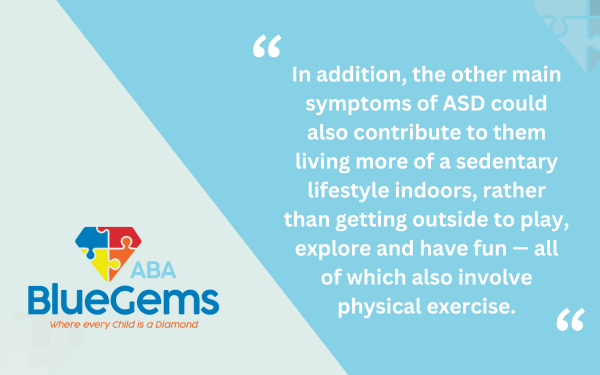Autism and Obesity
Obesity is a growing problem across all age cohorts in the United States. Childhood obesity is of particular concern, with the U.S. Centers for Disease Control and Prevention reporting that nearly 20% of children between the ages of 2 and 19 are obese.
Obesity is an even bigger concern among people who have autism spectrum disorder (ASD). A 2024 study highlighted that the obesity rates among children and adolescents with autism ranged anywhere from 7.9% to 31.8%, compared to only about 1.4% and 23.6% for those who don’t have autism.
Children who are obese are at much higher risk of developing serious health issues in their life1, including diabetes, hypertension, high cholesterol and many other problems.
Tackling the issue of autism and obesity is certainly not an easy one, as children with ASD face many challenges that can contribute to overeating, eating unhealthy and not exercising enough.
Below, we’ll dive into some of these contributing factors as well as how children on the autism can be supported in this regard.
Table Of Contents
What Are Some of the Common Reasons for Obesity in Autism?
ASD is commonly associated with difficulties with social interactions and communication. Yet, people who have autism also typically engage in repetitive behaviors, have restrictive interests and/or suffer from sensory sensitivities.
All of these common symptoms can unfortunately lead to obesity in children with autism, though they manifest in different ways.
Individuals with autism thrive on routines, and this can apply to what they eat, how they eat and when they eat. If they prefer unhealthy foods, this can become a big problem quickly. If the parent tries to introduce new, healthier foods, for instance, their child may become overwhelmed, stressed and display harmful behaviors or tantrums.
Sensory sensitivities might also contribute to obesity. If a child with ASD has an aversion to certain smells, tastes and textures, it may be difficult to get them to eat a well-balanced diet. In fact, children with autism can often be picky eaters.
In addition to these food-related issues, children with autism are typically less active than their neurotypical peers2. There are a number of reasons for this, too.
Since they often struggle with social interactions, they tend to spend more time alone. Activities that children participate in alone usually aren’t very active, either, which means they aren’t able to get the exercise they need.
In addition, the other main symptoms of ASD could also contribute to them living more of a sedentary lifestyle indoors, rather than getting outside to play, explore and have fun — all of which also involve physical exercise.

How Can Autism and Obesity Be Addressed?
If your child is on the autism spectrum, it’s important to recognize that they are at higher risk to be obese3. This means that you should pay attention to their eating and physical activity habits early on so that you can initiate interventions if need be.
Pediatricians, dieticians and other medical professionals can all play a role in helping you identify your child’s risk factor for obesity, as well as come up with solutions that might work for them.

At the same time, your child’s overall ASD treatment plan can help them build skills and modify behaviors in a way that could get them to eat healthier food and be more active.
Applied behavior analysis (ABA therapy) is the gold standard of treatment options for children with autism. It is a science- and evidence-based approach to learning and behavior that helps children with ASD overcome the common challenges they face as a result of their autism.
Specific goals can be set up to target a patient’s behaviors, symptoms and aversions, for instance, to help them overcome the challenges they face. In time, this can lead to them eating healthier and being more active, as they learn to communicate and interact with others better.
They can also learn how to modify certain negative behaviors with positive replacement behaviors that can get them what they want, balanced with what they need.
Trust Blue Gems ABA with Your Child’s Treatment
Obesity is a major concern for children with ASD, as they are at much higher risk of being obese than neurotypical children their age. Early interventions such as ABA therapy can help address many of the contributing factors to obesity to ensure your child is healthy.
At Blue Gems ABA, our team of experienced BCBAs administers ABA therapy on a one-to-one basis. We craft treatment plans that specifically address each individual patient’s unique strengths and challenges, which ensures the plan is as effective as possible.
To learn more, please contact us today.




